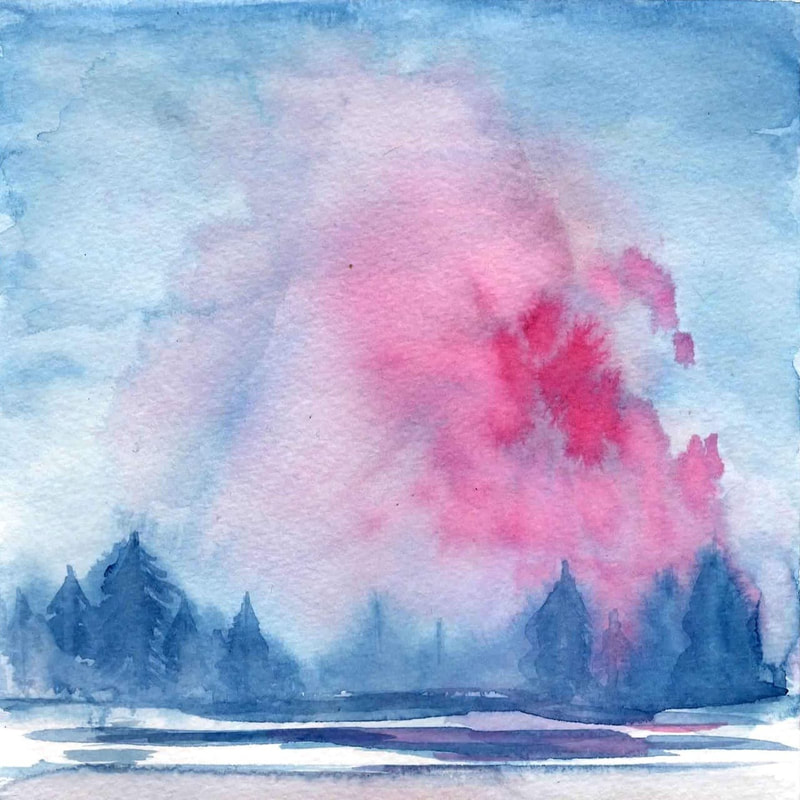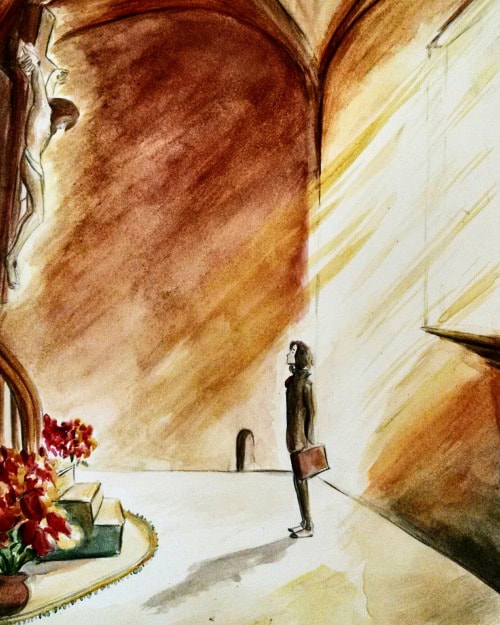|
When I worked as a waitress at a diner, we had a lot of regular customers. One of them would sometimes come in alone, or with his buddy, and they would share a booth in the front and drink coffee. One day, he came in alone.
It seemed like any other day. I came up to his booth. "Hey! How are you doing?" "Good.” He paused, looking shell-shocked. “Well… not really. My mom just died. She drowned in her pool." I was at a loss. There was nothing that could be said but to give my condolences and listen to him talk about the accident and get it off his chest. It sounded like a mix of a heart attack and a pool accident. I can’t remember the details, but it was sad and absurd. Death is absurd in a stupid way. I think anyone who has experienced loss could agree with the statement: Death is stupid. Death really shouldn’t happen, and we know it in our core. It wasn't the original plan. God didn't make death. The diner team I worked with at that restaurant had, in their own lives, experienced more than their fair share of death and suffering. But they would listen to the highs and lows of the restaurant guests and would really know how to sit with their stories. Most of them had experienced enough suffering in life to know that they did not need to shy away from it. While I worked there I heard bloody tales of Vietnam and experienced the sudden death of someone who I had worked with on the team. It was a two-year experience of growth for me, and characterized by a very strong mix of bizarre suffering and exquisite joy. While it was one of my most difficult jobs, if not the most difficult, it was, in many ways, the most joyful and prepared me for greater ease in my future jobs. This brings me to the main thought of this post: Do our struggles and sufferings speak prophetically to our future and… within that... is it a prophecy of hope? When you were growing up and through the years, what have been your experiences? What joys have you experienced? What struggles have you been facing and enduring? Did you grow up in a tumultuous household? Maybe you learned diplomacy and will be able to negotiate between “nations”, in schools, in counseling, and on the playground. Did you experience grief and loss? Maybe you learned how to find meaning beyond the material. A loss can make you sadder but wiser. It makes you learn, very quickly, what is essential. Petty things may no longer appeal to you. What jobs have you held? You may not have had a passion for them, but how do you think you would have been a different person today if not for that job? In retail and customer service, people have learned patience, self-denial, and how to think of others. Maybe your past suffering is preparing you for a future where you will be able to handle these things with ease and endurance. Perhaps you will be able to stand in those future situations of struggle long enough that you will be able to transform it into something beautiful, in your own life and in the life of others. There is something about suffering that can awaken a capacity for deep joy if it brings you to trust the future that God has, instead of the sort of basic one you could come up with on your own. “If God causes you to suffer much, it is a sign that He has great designs for you, and that He certainly intends to make you a saint.” -St. Ignatius of Loyola * The sainthood is the reward and joy. Sainthood empties you to experience God, Who is Joy. One can only focus on suffering for so long. Even Jesus, in His Passion, looked forward to the joy it would bring afterward. There needs to be hope for something good. It is possible that your suffering is preparing you for a future of fulfillment. If you have a lot of suffering, it could be an invitation to trust and ask God to do wonderful things. That could even be having the faith to ask for inexplicable joy amid sorrow. Maybe your loss has emptied you and you are now ready to be filled in a way you could never have been before. Because if you were already filled, you would never have asked for something greater and would never have gotten to know how great God is. You may never have come to love your “littleness” to use a word that St. Therese of Lisieux loved. Perhaps you would never have come to love the fact that you cannot provide anything for yourself but that you have a God who can. Never feel as if your life has been a waste. Even at the hour of death, a realization about how much you have wasted life is an even further invitation to throw yourself into the hope of a good God and a beautiful heaven. The pain of a realization can empty you so much that God can rush in and fill it in a moment if you let Him. Because He is so good and so tenderly close. You will have the option to believe in that at every moment. And so, even if you are going through a hardship right now, look back at your past and imagine the possible good that could come in the future from your past experiences. And ask God for a filling of something new and wonderful with it. Because your past speaks prophetically to your future and - if you let it - it is full of hope. . . . * Ref: St. Ignatius Quote: (https://www.catholicstoreroom.com/category/quotes/quote-author/ignatius-of-loyola-1491-1556/page/18/)
0 Comments
Jesus’ death on the cross shows that there is a value to the passion of sacrificial love. It is the basis for romance. After all, what is the point of an epic story without a madly-in-love, self-forgetful hero? Romantic love thrives on inexplicable love for another and the possibility of loss. It thrives in the free will choice God has given us to choose him. The will-they, won’t-they possibility is what makes romance - the all-or-nothing possibility. We have to have the possibility of rejecting God to have the romance of choosing Him. Why is it that great love stories are told from the wild abandon of being willing to die out of love for someone? In the song “Nessun dorma” from the opera Turandot the protagonist sings that he will tell his name to Princess Turandot only when his lips are on hers. The challenge he has given her is that if she can guess his name then he will die. If not, he will marry her. There is no logical reason why he should fall in love with this cold-hearted princess and make a wager with death. But he falls in love with her all the same and hopes for her love. True passionate love, such as Jesus demonstrates to us, does not pass quickly. It is deep and constant, not excitable and quickly fading. It treats people as sacred. And sacredness is the antidote to a cynical world. Jesus’ death on the cross can be seen as a gesture of unabashed love and a demonstration of the way God operates. And its beauty invites us to forget ourselves. We see this self-forgetful beauty play out when there is unity in a good community, friendship, or marriage– people die to themselves and become remade in a new life and the sorrows of other possibilities are forgotten. The choice to love has been made and new life begins with peaceful joy - the reward of romance! And that is what we receive when we choose the God of Love. And that is something worth singing about. |
Quis ut Deus?In search of the Face of God. Personal blog with musings, thoughts, and stories. Archives
June 2024
Categories |


 RSS Feed
RSS Feed